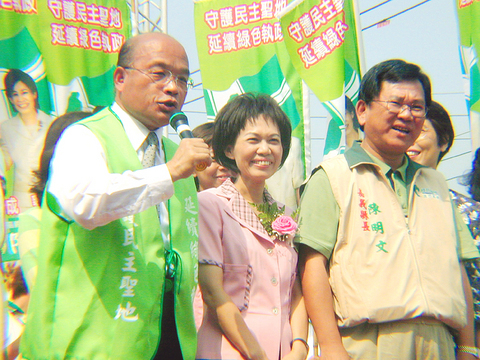The "new Democratic Progressive Party (DPP) movement" faced an early death after DPP Chairman Su Tseng-chang (蘇貞昌) convened party heavyweights on Saturday night for talks on recent controversies, and agreed that the movement should be silenced forever.
In the wake of flak from President Chen Shui-bian (陳水扁) over the new DPP movement, which advocates self-criticism and reforms, Su on Saturday convened an urgent meeting of party members from each faction to address recent quarrels among them.
Those who attended the meeting included Gao Jyh-peng (高志鵬), secretary-general of the Justice Alliance (正義連線), Chiu Chuei-chen (邱垂貞), chief of the Welfare State Alliance (福利國連線), Chen Sheng-hung (陳勝宏), convener of the Green Alliance (綠色連線), Tuan Yi-kang (段宜康), convener of the New Tide (新潮流) faction and other party higher-ups, including legislative caucus whips William Lai (賴清德) and Jao Yung-ching (趙永清), DPP Legislators Lee Wen-chung (李文忠) and Ker Chien-ming (柯建銘), and DPP Secretary-General Lee Yi-yang (李逸洋).

PHOTO: CNA
After about two hours of discussion, Su held a news conference at about 10pm and announced that a consensus had been reached on two points.
First, the DPP will fully support the six reforms pledged by the president during his National Day speech and the legislative caucus will propose concrete reforms with the administrative departments of the Executive Yuan. Second, the legislative caucus will establish a negotiation and communication mechanism to help carry out reforms, according to Su.
"Today's consensus is that the DPP will stick to reforms. And reforms will not influence consolidation. Our consolidation is for the sake of reforms," Su said on Saturday night.
Meanwhile, party officials also discussed the controversial new DPP movement, which has ignited internal feuds between the party's New Tide faction and other factions. Officials agreed that the factions should call a truce and never bring up the term "the new DPP movement" again.
Additionally, the airing of criticisms or rumors through the press is also prohibited, Su said.
Su added that he supported the spirit of the new DPP movement, but the title seemed inappropriate.
"There is no problem of the new DPP or the old DPP. There is only a problem of reforming or not." Su said. "We will not allow internal attacks among factions after this."
Other participants voiced similar views, saying that little communication had occurred before the movement had been proposed, and that its advocates had offered few practical measures for its implementation, which only hurt the DPP's image and unity.
In the face of criticism from Su and other party members, Tuan, one of the movement's advocates and also the convener of the New Tide faction, did not respond directly to it, saying only that Su's statement was the basis for any questions about the new DPP movement.

Chinese Nationalist Party (KMT) Chairman Eric Chu (朱立倫), spokeswoman Yang Chih-yu (楊智伃) and Legislator Hsieh Lung-chieh (謝龍介) would be summoned by police for questioning for leading an illegal assembly on Thursday evening last week, Minister of the Interior Liu Shyh-fang (劉世芳) said today. The three KMT officials led an assembly outside the Taipei City Prosecutors’ Office, a restricted area where public assembly is not allowed, protesting the questioning of several KMT staff and searches of KMT headquarters and offices in a recall petition forgery case. Chu, Yang and Hsieh are all suspected of contravening the Assembly and Parade Act (集會遊行法) by holding

PRAISE: Japanese visitor Takashi Kubota said the Taiwanese temple architecture images showcased in the AI Art Gallery were the most impressive displays he saw Taiwan does not have an official pavilion at the World Expo in Osaka, Japan, because of its diplomatic predicament, but the government-backed Tech World pavilion is drawing interest with its unique recreations of works by Taiwanese artists. The pavilion features an artificial intelligence (AI)-based art gallery showcasing works of famous Taiwanese artists from the Japanese colonial period using innovative technologies. Among its main simulated displays are Eastern gouache paintings by Chen Chin (陳進), Lin Yu-shan (林玉山) and Kuo Hsueh-hu (郭雪湖), who were the three young Taiwanese painters selected for the East Asian Painting exhibition in 1927. Gouache is a water-based

Taiwan would welcome the return of Honduras as a diplomatic ally if its next president decides to make such a move, Minister of Foreign Affairs Lin Chia-lung (林佳龍) said yesterday. “Of course, we would welcome Honduras if they want to restore diplomatic ties with Taiwan after their elections,” Lin said at a meeting of the legislature’s Foreign Affairs and National Defense Committee, when asked to comment on statements made by two of the three Honduran presidential candidates during the presidential campaign in the Central American country. Taiwan is paying close attention to the region as a whole in the wake of a

OFF-TARGET: More than 30,000 participants were expected to take part in the Games next month, but only 6,550 foreign and 19,400 Taiwanese athletes have registered Taipei city councilors yesterday blasted the organizers of next month’s World Masters Games over sudden timetable and venue changes, which they said have caused thousands of participants to back out of the international sporting event, among other organizational issues. They also cited visa delays and political interference by China as reasons many foreign athletes are requesting refunds for the event, to be held from May 17 to 30. Jointly organized by the Taipei and New Taipei City governments, the games have been rocked by numerous controversies since preparations began in 2020. Taipei City Councilor Lin Yen-feng (林延鳳) said yesterday that new measures by